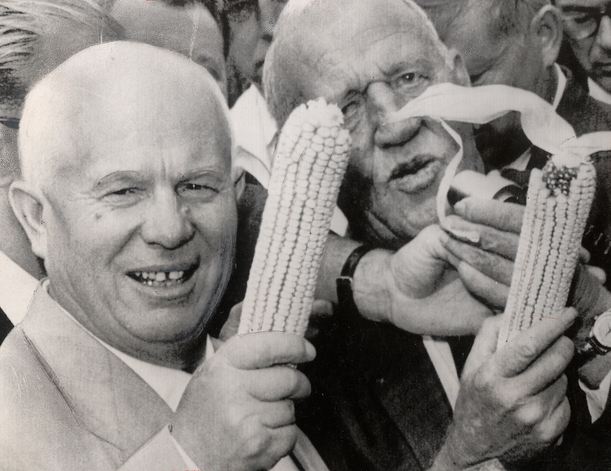During Khrushchev's time at the helm, which lasted to 1964, life in the Soviet Union was much less harsh than it had been under Stalin.
在赫鲁晓夫的统治时期,也就是1964年之前,苏联人民的生活和斯大林时期相比不那么艰难了
Khrushchev instigated no purges, production of consumer goods was increased and apartment buildings began to sprout up instead of factories.
赫鲁晓夫并不煽动大清洗运动,消费品的生产增加了,很多公寓楼而不是工厂开始拔地而起
The USSR also made well meaning attempts to mend fences with communist rivals in Yugoslavia and Red China.
在南斯拉夫和中国,苏联还做出了有意义的尝试来修补对于共产主义敌人的防御
The sudden end to the bloody stalemate in Korea just after Stalin's death was no accident, but for all the friendly public relations initiatives,
斯大林死后,朝鲜出现的血腥的僵局并不是意外的状态,但尽管发起这一切友好的公共关系的措施
Khrushchev's USSR was still welded to the old Stalinist goals of military superiority and fostering world revolution.
赫鲁晓夫领导下的苏联仍紧紧和旧的斯大林的目标相关,即军事优势和孕育世界革命

For all of his bluster Khrushchev himself was a dangerous foe who believed implicitly in the triumph of communism,
鉴于他咄咄逼人的声势,赫鲁晓夫自己是一个危险的敌人,他暗中相信共产主义的胜利
he believed it would happen in 1980.
他觉得胜利会在1980年到来
Once the USSR had built its first nuclear bomb and blew it up in 1949,
一旦苏联制成了其首枚核弹并在1949年成功爆炸
the arms race boiled down to developing more effective means of delivering the deadly goods.
军备竞赛就浓缩于开发运送这种致命武器的更有效的方式上
The US and its allies originally favoured long range bombers while the soviets experimented with rockets.
美国极其盟国起初喜欢远程导弹,而苏联却研究火箭













